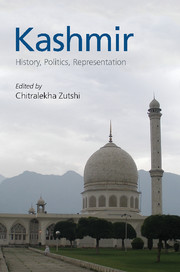Book contents
- Frontmatter
- Dedication
- Contents
- Acknowledgements
- Map 1 Pre-Partition Jammu and Kashmir
- Map 2 Contemporary Kashmir
- Introduction: New Directions in the Study of Kashmir
- PART I HISTORY
- PART II POLITICS
- 5 Azad Kashmir: Integral to India, Integrated into Pakistan, Lacking Integrity as an Autonomous Entity
- 6 ‘Not Part of Kashmir, but of the Kashmir Dispute’: The Political Predicaments of Gilgit-Baltistan
- 7 Law, Gender and Governance in Kashmir
- 8 ‘Survival Is Now Our Politics’: Kashmiri Pandit Community Identity and the Politics of Homeland
- 9 Beyond the ‘Kashmir’ Meta-Narrative: Caste, Identities and the Politics of Conflict in Jammu and Kashmir
- 10 Contested Governance, Competing Nationalisms and Disenchanted Publics: Kashmir beyond Intractability?
- PART III REPRESENTATION
- Contributors
- Index
5 - Azad Kashmir: Integral to India, Integrated into Pakistan, Lacking Integrity as an Autonomous Entity
from PART II - POLITICS
Published online by Cambridge University Press: 03 August 2019
- Frontmatter
- Dedication
- Contents
- Acknowledgements
- Map 1 Pre-Partition Jammu and Kashmir
- Map 2 Contemporary Kashmir
- Introduction: New Directions in the Study of Kashmir
- PART I HISTORY
- PART II POLITICS
- 5 Azad Kashmir: Integral to India, Integrated into Pakistan, Lacking Integrity as an Autonomous Entity
- 6 ‘Not Part of Kashmir, but of the Kashmir Dispute’: The Political Predicaments of Gilgit-Baltistan
- 7 Law, Gender and Governance in Kashmir
- 8 ‘Survival Is Now Our Politics’: Kashmiri Pandit Community Identity and the Politics of Homeland
- 9 Beyond the ‘Kashmir’ Meta-Narrative: Caste, Identities and the Politics of Conflict in Jammu and Kashmir
- 10 Contested Governance, Competing Nationalisms and Disenchanted Publics: Kashmir beyond Intractability?
- PART III REPRESENTATION
- Contributors
- Index
Summary
Introduction
The dispute over the international status of Jammu and Kashmir (J&K) did not start the way that most Indians and many Pakistanis say it did. For them, violence began in the polyglot princely state when Pukhtoon tribesmen coming from Pakistan invaded J&K's Kashmir Province on 22 October 1947. These Pukhtoons, almost certainly sent by Pakistani officials, wreaked havoc as they headed for Srinagar, ostensibly to capture the ruler of Muslim-majority J&K and his summer capital for Pakistan. Distracted by their looting, raping and killing of locals, the tribesmen failed on both counts. India ensured this failure by dispatching its military to J&K to help Maharaja Hari Singh defend ‘his’ princely state of which, increasingly, he was losing control. The Indians did so after the Maharaja duly acceded to India on 26 October 1947. Pakistan claimed this accession was based on ‘fraud and violence’ (Keesing's Archives, 1947). India's military arrived in Srinagar the next day – and has remained in J&K ever since.
This is India's version, in which Pakistan has surprisingly often acquiesced. It is incorrect. The Pukhtoons’ invasion of Kashmir Province neither initiated violence in J&K, nor instigated the dispute over J&K's international status. Before Hari Singh's accession to India, the people of J&K – or J&K-ites, as I call them – had taken three significant actions themselves. These actually instigated the so-called ‘Kashmir dispute’ (Snedden, 2012, 37–63). First, soon after the British partitioned India on 15 August 1947, and possibly beforehand, Muslims in the jagir of Poonch, a semi-autonomous region in western Jammu Province, began an anti-Maharaja uprising. Muslims in the neighbouring southerly Mirpur District soon joined them. Ostensibly, these Muslims objected to the Maharaja's excessive taxation, with Poonchis particularly aggrieved because their local ruler also taxed them. Equally, they were seeking to ensure that the princely state, weakened significantly by its loss of support from the departing paramount power (the British), would join newly-created Pakistan, not India.
Second, significant inter-religious violence occurred in Jammu Province in September-October 1947 between pro-Indian Hindus and Sikhs, who were numerically strongest in the province's eastern parts, and pro-Pakistan Muslims, who dominated its west. While all communities suffered through death, destruction and dislocation, arguably Muslims in eastern Jammu suffered most of all.
- Type
- Chapter
- Information
- KashmirHistory, Politics, Representation, pp. 113 - 131Publisher: Cambridge University PressPrint publication year: 2017



